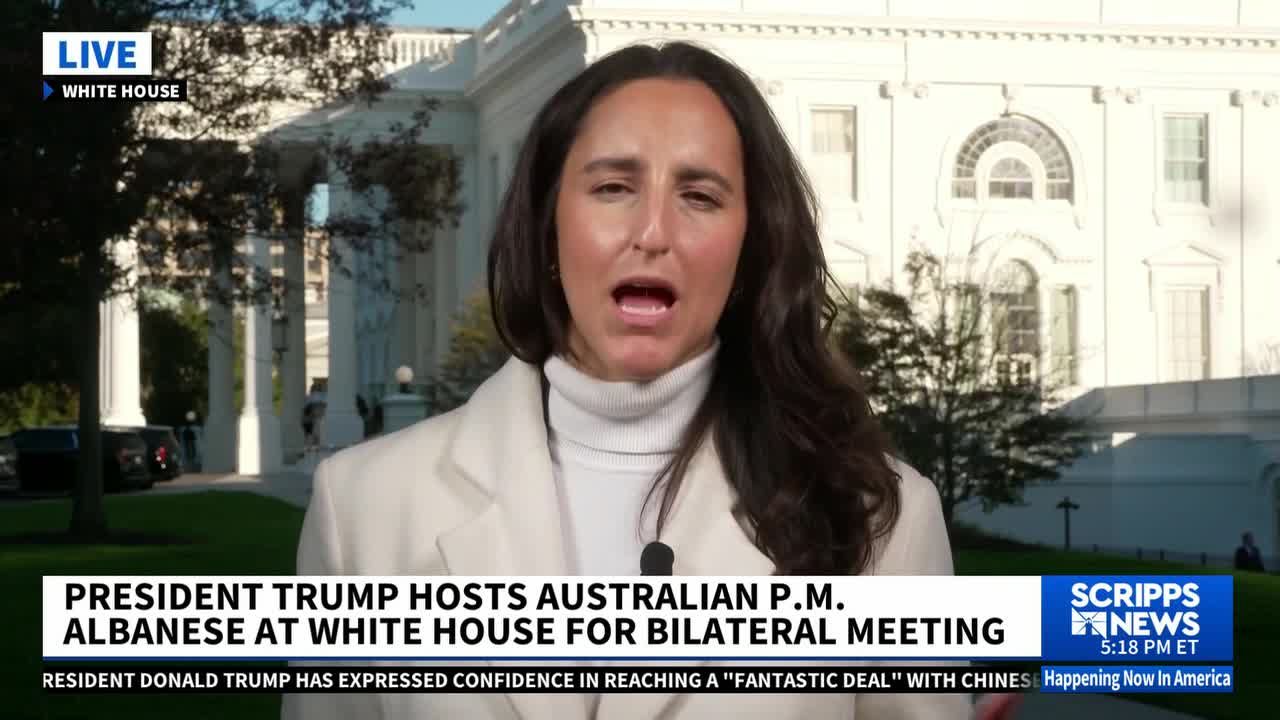President Donald Trump and Australian Prime Minister Anthony Albanese signed an agreement at the White House Monday to increase access to critical rare earth minerals, as the U.S. and its allies seek to limit reliance on Chinese goods and increase supply chain resiliency.
The new framework comes as China has sought stricter export controls on critical minerals and rare earth materials, prompting a threat from President Trump of greater tariffs on Chinese goods.
“We can continue to take what is every opportunity to improve the relationship even further and make it even stronger. And today's agreement on critical minerals and rare earths is just taking it to the next level, seizing those opportunities which are before us, to take our relationship to that next level,” Albanese said.
The White House says the governments will invest more than $3 billion in critical mineral projects. The framework calls for countries to provide at least $1 billion in financing projects within six months, which Australia noted investments will go towards an $8.5 billion pipeline in priority critical mineral projects.
According to the White House it will “unleash the potential of our abundant natural resources—a model for supply-chain cooperation globally.”
“We've been working on that for quite a while. In about a year from now, we'll have so much critical mineral and rare earths that you won't know what to do with them. They'll be worth about $2” Trump said of the deal.
According to the Prime Minister’s office, projects include a gallium recovery project in Western Australia with investment from the United States, that it says will provide up to 10 percent of the global gallium supply.
RELATED STORY | China warns of ‘resolute measures’ if US pushes ahead with 100% tariff
As the countries focus on defense cooperation, the White House announced Australia will buy more than $1 billion in unmanned underwater vehicles and that the countries would work to develop a technology deal.
Trump also appeared to offer support for a multi-billion-dollar trilateral security partnership between Australia, the U.K. and the U.S., dubbed ‘AUKUS,’ finalized under the Biden administration.
“It was made a while ago, and nobody did anything about it, and it was going too slowly. We do actually have a lot of submarines. We have the best submarines in the world, anywhere in the world, and we're building a few more, currently under construction, and now we're starting we have it all set with Anthony. We've worked on this long and hard, and we're starting that process right now. And I think it's really moving along very rapidly, very well” Trump said while speaking about the trilateral partnership.
The initiative has been under review in the Trump administration, “ensuring that this initiative of the previous Administration is aligned with the President’s America First agenda,” a defense official stated in June. An official noted it is “still under review.”
The deal allows the provision of nuclear-powered submarines to Australia and for the countries to partner on developing technology including quantum technology, artificial intelligence, hypersonic missiles, electric warfare and advanced cybersecurity.
“Australia is a very important ally of ours in the Indo Pacific since World War One, and they've always been side by side. The facility that they're building Southwest is critical from very important to our ability to project power in the Indo Pacific, and work with our allies. So we're working very closely. I think what we're really trying to do is take the original AUKUS framework and improve it for all three parties, and make it better and clarify so that the ambiguity that was in the prior agreement. So it should be a win-win for everybody,” Secretary of the U.S. Navy John Phelan said.
Discussions about the agreement come as both nations are looking to counter China in the Indo-Pacific region. While President Trump agreed that he sees AUKUS as a deterrent, he said “I don't think we're going to need it. I think we'll be just fine with China.”
Trump has threatened an additional 100 percent tariff on Chinese goods if the US and China do not reach a trade deal by November 1st, following China’s steps to restrict critical mineral exports. He indicated he still plans to meet with Chinese President Xi Jingping.
“I'm meeting with President Xi, we have a very good relationship. We're going to be meeting in South Korea in a couple of weeks, and we'll see what we can do. We have a very good relationship with China, but, you know, it's been, it's been probably a little bit like your relationship with China. They try and take advantage,” Trump said.
The U.S. currently levies a 10% baseline tariff against Australian imports, as well as additional tariffs on steel, aluminum, trucks, furniture and other goods.
“We're the hottest country anywhere in the world. We're dead. A year and a half ago, we were a dead country. Now we're the hottest country in the world economically and otherwise so. But I will say this, Australia pays very low tariffs, very, very low tariffs. Australia pays among the lowest tariffs,” Trump said when pressed on the trade relationship between the allies.
The visit marked Albanese’s first visit to the White House during Trump’s second term in office.



